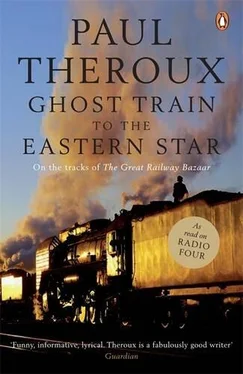"My grandmother — her name was Matryona — wanted to bury her brothers but couldn't find their bodies. And her grief didn't end there. After World War Two there was a big famine. As the daughter of a kulak, with primary school honors — ha! — she was made head of a farm. There were no strong men left. She was suffering from hunger.
"In 1946, her son — my seventeen-year-old uncle — went looking for food. They were so hungry they'd go to the fields to look for grains of wheat that had been left behind after the harvest. He found a few grains. And he was seen. He was arrested for theft.
"He screamed at the police, 'You are monsters! You have food and we have nothing!'
"For saying that, he was given a twenty-five-year sentence. He spent it in Magadan and Kolyma, washing gravel for gold. There was almost no communication with his mother. In 1954 when Stalin died, he was rehabilitated. He died three years ago and — you know? — he would never speak a word about his imprisonment.
"My grandmother was so afraid of the KGB that when the name was mentioned she made a face. The worst document she'd ever seen in her life was that of her son's sentence. Imagine, twenty-five years. He would have got ten years for theft, but he screamed 'You monsters,' so he got fifteen more."
Now we were in the deep countryside, no other cars at all, and the road was buried in snow. The landscape was like a charcoal drawing on white paper — the black woods and the smudged sky and the whiteness of the blizzard.
"There are thousands of such stories," Viktor said. "It's a story of terror. People were afraid of anyone in power. The system was cruel. The whole basis of it was that Stalin wanted slave labor."
All this time, Yelena was translating and I was writing in the notebook on my knee, which was easy because of the pauses between the men speaking and Yelena's translation.
"And you couldn't trust anyone," Sergei said. "I had a problem myself. I was on file, someone had betrayed me."
"What had you done?"
"Told political jokes," Sergei said. "But I found out about my file in a roundabout way. I was working for Komsomol" — the communist youth organization—"in the Political Education Department. It was the eighties. We were dealing with vets from Afghanistan. They had severe stress and trauma, and they found it hard to adjust to life.
"I was stressed too, from the work. I wanted to travel abroad. I put in my application. I was told I'd need a reason. I gave one. They said, 'No, Sergei. Sorry, Sergei.'
"What? I was very surprised that I was not allowed to go. Five years later, after the USSR broke up, I found out the reason. The KGB gave me the information. That's a funny story. In 1989 I was in Czechoslovakia, the Velvet Revolution, when Havel became president. I was there the whole time. I was running a travel agency.
"The KGB came to me — some guys. They said, 'What happened? What's this Velvet Revolution? We don't want the same thing here.'
"I decided to blackmail them. I said, 'I'll tell you about the Czechs if you show me my file.'
"They finally agreed. I looked through my file and I was amazed. It turned out the informant was a girl I knew, a colleague in the Komsomol. After office parties, she wrote reports about who was telling jokes. I had trusted her!"
Big-shouldered, bearish, funny Sergei was hunched over the wheel, squinting into the snowstorm and the road ahead, and reminiscing. I could imagine him with a glass of vodka in his hand, drunk and yakking, being the life and soul of a party.
"Here's the really funny part," he said. "At the time, I sincerely believed in communism! I was deputy secretary, responsible for the ideology of the young people. We were believers! I discovered that there were three other spies in my office. And it was an ideological organization!"
"Were you scared when you found out about your file?" I asked.
"Not scared. I was very disappointed. I was disgusted. Here I was, intelligent. I thought our system was the best. But the trouble was, our leaders were old. Brezhnev, Andropov, Gorbachev. Old men!"
"Tell me a political joke," I said.
"I can only think of Putin jokes."
I said, "Surely the jokes are the same, and only the names of the men change."
"No. There are specific jokes. Brezhnev jokes were different altogether."
"Such as?"
Viktor chipped in. "Here's one. A man is talking to another. He says, 'Have you heard that Brezhnev had an operation for chest expansion? More room for medals!'"
"It sounds better in Russian," Yelena added after she'd translated.
Sergei then told a long and bewildering joke about Brezhnev overhearing his neighbors watching a hockey game on television. He said. They said. He said. I wrote it down but didn't understand it.
When I didn't laugh at the punch line, Sergei said, "Jokes about Brezhnev are kindhearted. For one thing, he wasn't well. For another, compared to Stalin and Khrushchev, he was good. But Andropov was a problem. He initiated more repression of dissidents."
"What about the woman who reported on your jokes?" I asked. "What happened to her?"
"I saw her a few years later," Sergei said, chuckling at the memory. "I gave her a few shots of vodka, then told her what I knew. I asked, 'Why did you do it?'
"She just looked at me. 'I was doing my duty,' she says."
"So she didn't apologize?"
"Not at all. She said, 'I wanted to report everyone who was two-faced.' Listen, Paul, I have a huge file. Ha!"
We had gone sixty or more miles into the snow-covered pine forest of Chusovskoy Oblast, the snow blowing across the road in some places, the wind creating sharply pleated drifts. It was another vast but oversimple black-and-white landscape, beautiful and terrifying in its starkness. Just the way the snow danced in the headlights, swirling and funneling in the gusts, took my attention away from the stories of betrayal. I tried to imagine being a prisoner in this storm, on foot or in the back of a locked truck. There had been millions. Everything that made this place lovely for me, for a prisoner meant only death.
"This is Kuchino," Yelena said, as Sergei slowed and took a sharp right into very deep snow, going slowly past a village of dark wooden cottages. The half-buried buildings had scalloped, gingerbreaded shutters and wooden ornaments — flowers and squiggles — and some were log cabins, which dated from czarist times.
Boys and men wandered in the road, dangerously close to our car, peering at us from under fur hats. Their faces were red with cold, snot glistening under their noses, their mouths open as though calling out to us.
"Everyone here is feeble-minded," Yelena said. "They were sent here, to the hospital."
But it wasn't really a hospital. It was an old-fashioned asylum where the patients had been rusticated, and during the day many of them were turned out to wander in the snow. Until they were sent here, they had been locked in a gold-domed cathedral — decommissioned to serve as a madhouse — near the city of Kungur, ninety miles down the Siberian road.
A few miles beyond Kuchino, we came to a steel wall surrounded by trees, and a big gate, and a sign beside it saying that we'd come to Perm 36. A former corrective labor colony, I read, and the rest was obscured by the falling snow.
One of the patients from the asylum had followed us to the big gate and began pleading in Russian as we drove through.
The compound was so simplified by the snowfall it could have been a Boy Scout camp, but that was a first and fleeting impression. The barbed wire at the top of the high walls and near every entrance told a truer story. So did the small barred windows, the windowless truck in which prisoners were transported, and, when I went inside, the cells, the bunks, the barracks, the torture chambers.
Читать дальше












